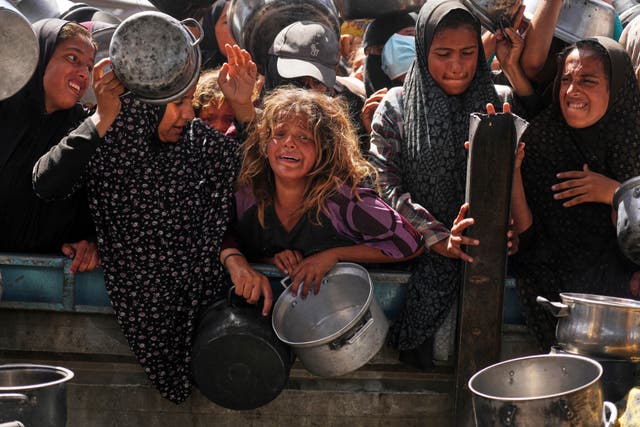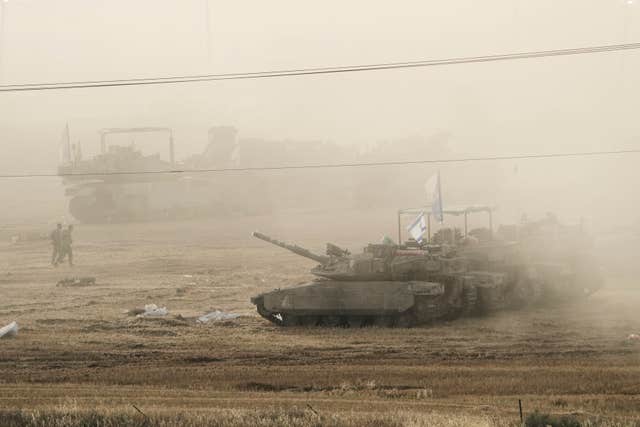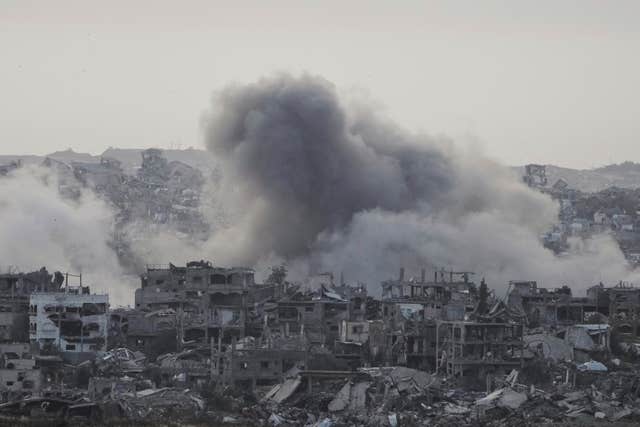Israel launches major Gaza offensive as talks continue on possible ceasefire
The military operation in the Palestinian territory came a day after Donald Trump concluded his Middle East trip without a visit to Israel.

Israel has launched a major military operation in the Gaza Strip in a bid to pressure Hamas to release hostages while Prime Minister Benjamin Netanyahu told a negotiating team to remain in Qatar for indirect talks with the militant group.
Defence minister Israel Katz said Operation Gideon Chariots was being led with “great force”.
Mr Netanyahu had vowed to escalate pressure with the aim of destroying the militant group that has ruled Gaza for nearly two decades.
The military operation in the Palestinian territory came a day after US President Donald Trump concluded his Middle East trip without a visit to Israel.

There had been hope that his visit could increase the chances of a ceasefire deal or the resumption of humanitarian aid to Gaza, which Israel has prevented for more than two months.
An Israel official said that Nr Netanyahu was in constant contact throughout the day with the negotiating team in Doha, Qatar, and US envoy Steve Witkoff, and instructed the team to remain there.
Hamas, which released an Israeli-American hostage as a goodwill gesture before Mr Trump’s trip, insists on a deal that ends the war and leads to the withdrawal of Israeli forces — something Israel said that it will not agree to.
Israel’s army said on social media it would not stop until the hostages are returned and the militant group is dismantled.
Israel believes as many as 23 hostages in Gaza are still alive although Israeli authorities have expressed concern for the status of three of them.
More than 150 people have been killed in Israeli strikes in the last 24 hours, according to Gaza’s Health Ministry. It said more than 3,000 have been killed since Israel broke a January ceasefire on March 18.
On Saturday afternoon, an Israeli strike killed at least four children in the Jabaliya refugee camp in the north, according to al-Awda Hospital. Seven others were wounded in the strike, which hit a house. A later strike in Jabaliya killed four, the hospital said.
“This is unacceptable. Until when? Until we all die?” asked a sweating Naji Awaisa as he and others fled Jabaliya with their belongings down streets lined with shattered buildings. Smoke from air strikes rose in the distance.

Air strikes around Deir al-Balah in central Gaza killed 14 people, with the bodies arriving at al-Aqsa hospital. One strike on a house killed eight people, including parents and four children.
A strike hit outside a school sheltering displaced people in Gaza City, killing four, the Gaza Health Ministry’s emergency service said.
There was no immediate Israeli comment on the strikes. A separate statement said that the military had killed dozens of fighters while dismantling an “underground route” in northern Gaza.
Hundreds of protesters rallied on Saturday night in Tel Aviv, some holding photos of Palestinian children killed in Gaza, with others demanding a deal to end the war and bring all hostages home.
“Let me be crystal clear. All of Israeli society, left, right, secular, religious, stands united in calling for a hostage deal. To miss this moment for a deal would be a betrayal of history, a stain that will never fade,” Dalia Kushnir-Horn, sister-in-law of hostage Eitan Horn, told the crowd.
Gaza is in the third month of an Israeli blockade with no food, water, fuel or other goods entering the territory of more than 2 million people. Food security experts say Gaza will be in famine if the blockade is not lifted.

Earlier this week, a new humanitarian organisation that has US backing to take over aid delivery said it expects to begin operations before the end of the month – after what it describes as key agreements from Israeli officials.
A statement from the group, the Gaza Humanitarian Foundation, identified several US military veterans, former humanitarian coordinators and security contractors that it said would lead the delivery effort.
Many in the humanitarian community, including the UN, said they will not participate because the system does not align with humanitarian principles and won’t be able to meet the needs of Palestinians in Gaza.
A statement on Friday by Tom Fletcher, the United Nations’ humanitarian chief, said the plan is “rooted in the non-negotiable principles” and that the UN has people ready to deliver assistance. He demanded the rapid, safe and unimpeded aid delivery for civilians.
The war began on October 7 2023, when Hamas-led militants attacked southern Israel, killing 1,200 people and abducting 251 others.
Israel’s retaliatory offensive has killed more than 53,000 Palestinians, many of them women and children, according to Gaza’s health ministry, which does not differentiate between civilians and combatants.





